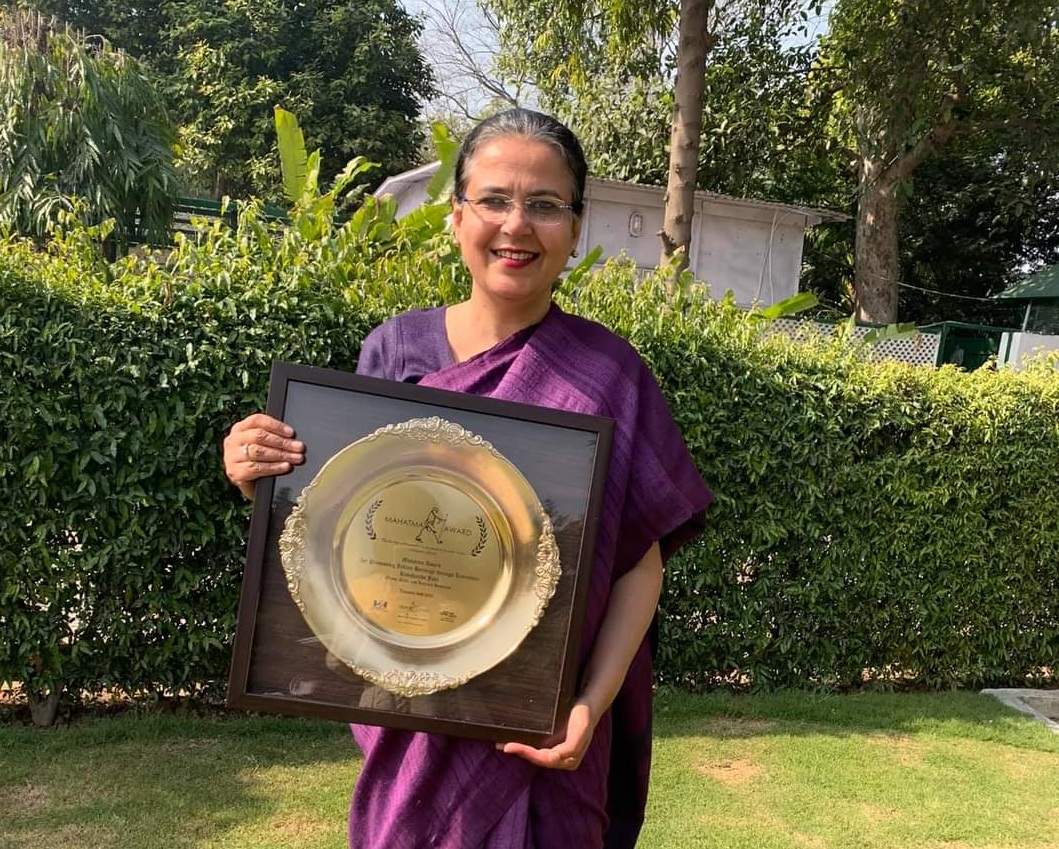This celebrated literary historian says that every writer must speak up against tyranny
This celebrated literary historian says that every writer must speak up against tyrannyon Mar 09, 2021

Rakshanda Jalil tells us about her work and how she is trying to bring back the pluralistic heritage of India.
A writer, historian, and critic, Rakshanda Jalil has spent decades introducing her readers to Indian heritage, history, and poetry. With several highly acclaimed books like Invisible City: Hidden Monuments of Delhi and Release & Other Stories, the 57-year-old has made a huge contribution to the promotion of Indian heritage through literature. She also runs an organisation called Hindustani Awaaz to promote Urdu-Hindi literature and culture, frequently writes opinion pieces for prominent newspapers and translates Urdu poems. Recently, she was rightly rewarded for her work by being conferred the Mahatma Award for her contributions in promoting Indian heritage through literature. The Mahatma award is founded and constituted by philanthropist and social entrepreneur Amit Sachdeva to honour social impact leaders and change-makers.
In an interview, she tells us all about her love for Indian literature and why writers need to keep speaking up against the many injustices occurring today. Excerpts:
1. Tell us a bit about your childhood. How different was India then compared to India today, in terms of secularism?
Born in 1963, I grew up in an India that still had vestiges of Nehruvian idealism and born to parents who were fervent admirers of both Gandhi and Nehru, I was raised to believe in the values of thrift, self-sufficiency and independence. Waste-not, want-not was pretty much a mantra. You didn't waste food, you didn't overspend, you didn't leave the tap or the light on because — as you were repeatedly told — someone, somewhere in our country was trudging miles to fetch water or was studying under the light of a flickering lamp.
Undoubtedly, mine was a happy childhood. We were mindful that we had the greatest privilege, namely education and education alone was the great leveller — not money, not class or caste. And yes, secularism was an article of faith in my family. We were religious, yes, but we were taught not to wear our religion on our sleeve. True religion, we were constantly told, is a private and personal matter. I still believe that.
2. What inspired you to start writing about Indian history and heritage?
My mother was the senior school librarian in our school. After junior school, I would stay back to go home with her; she encouraged me to read. In our house too, we were surrounded by books. My siblings and I had enough books to start a library. As a middle-class family, we may not have had many luxuries but we always had money to buy books. Our parents would take us for picnics to nearby old monuments and Delhi has so many of them everywhere. A love for heritage, for books and reading was in the very air that I breathed as a child!
3. Tell us a bit about your organisation Hindustani Awaaz. What change did you hope to bring about when you started it and how it that going now?
I set up Hindustani Awaaz in 2003, single-handedly and with no financial support, to position and promote Hindustani literature and its rich oral tradition. It seeks to popularise various elements culled from the different genres of Urdu and Hindi language and literature. In the broadest sense, it endeavours to provide a platform for scholarly and non-scholarly views and voices in Hindustani on Hindustani. In doing so, it also seeks to showcase the rich pluralistic heritage of India that is also known as Ganga-Jamuni tehzeeb. With this, I am trying to establish, repeatedly, that much can be done without any funds whatsoever. Enterprise and enthusiasm can suffice. I am proud that Hindustani Awaaz has no bank account; we take no money and we give none to those who work with us.
4. In a time in India where dissent is being punished, how do you as a writer/critic continue to put your views across? What would you say to other writers/critics?
Keep writing, keep speaking up. Like the poet Ghalib said:
Likhte rahe junoon ki hikaayat-e khoon-chakaan
Har-chand iss mein haath hamare qalam huwey
(We kept writing passionate blood-drenched narratives
Even though our hands were chopped off for it)
Every age has its tyrannies. A writer must speak up for their age or else find another calling!
5. In one of your articles for a news website, you wrote about how ancient poetry had a lot to do with farmers and their lives. Considering the recent crisis farmers are in, do you think the literature community is helping?
Till recent times even — in films, cinema, popular culture — the farmer had a marked presence. He seems to have slipped from our collective consciousness and become either a statistic in a newspaper article on farmer suicides or a nuisance who blocks roads and sits on dharnas. Such is our collective blasé disregard for those who feed us. It saddens me.
6. Do you have any other books/translations/poems in the pipeline?
Always! Multiple ones! I am translating the collected works of Gulzar, writing a history of the women's college at Aligarh, and translating from English to Hindi (a first for me) my own short stories that were published in 2011.
Read more: Indian author Varavara Rao ‘free at last’ after being granted bail on health grounds
Frontlist
Frontlist Latest news
Frontlist News
Hindustani Awaaz
Indian history and heritage
Rakshanda Jalil
Urdu-Hindi literature and culture

.jpg)
.jpg)
.jpg)
.jpg)
.jpg)
.jpg)

.jpg)
.jpg)
.jpg)
.jpg)


.jpg)
.jpg)
.jpg)










Sorry! No comment found for this post.